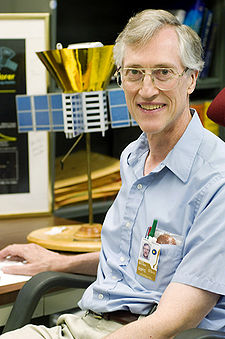John C. Mather
| John Cromwell Mather | |
|---|---|
 |
|
| Born | August 7, 1946 Roanoke, Virginia, USA |
| Residence | United States |
| Nationality | United States |
| Fields | Astrophysics, cosmology |
| Institutions | NASA |
| Alma mater | Swarthmore College University of California, Berkeley |
| Known for | Cosmic microwave background radiation studies |
| Notable awards | Nobel Prize in Physics (2006) |
- For other persons with a similar name, see John Mather.
John Cromwell Mather (b. August 7, 1946, Roanoke, Virginia) is an American astrophysicist, cosmologist and Nobel Prize in Physics laureate for his work on the Cosmic Background Explorer Satellite (COBE) with George Smoot. COBE was the first experiment to measure "... the black body form and anisotropy of the cosmic microwave background radiation."
This work helped cement the big-bang theory of the universe. According to the Nobel Prize committee, "the COBE-project can also be regarded as the starting point for cosmology as a precision science."[1]
Mather is a senior astrophysicist at the U.S. space agency's (NASA) Goddard Space Flight Center in Maryland and adjunct professor of physics at the University of Maryland, College Park. In 2007, Mather was listed among Time magazine's 100 Most Influential People in The World.
Mather is also the project scientist for the James Webb Space Telescope, a space telescope to be launched to L2 no earlier than 2013.
In October 2010 Mather will be participating in the USA Science and Engineering Festival's Lunch with a Laureate program where middle and high school students will get to engage in an informal conversation with a Nobel Prize winning scientist over a brown bag lunch[2]. Mather is also a member of the USA Science and Engineering Festival's Advisory Board[3].
Contents |
Biography
Education and initial research
- 1964 Newton High School, Newton, New Jersey[4]
- 1968 B.Sc. (Physics), Swarthmore College
- 1974 Ph.D. (Physics), University of California, Berkeley
- 1974-76 (NRC Postdoctoral Fellow), Columbia University Goddard Institute for Space Studies
Honors and awards
- 1964-68 Swarthmore College Open Scholarship (honorary)
- 1967 William Lowell Putnam Mathematical Competition, 30th place nationwide
- 1968-70 NSF Fellowship and honorary Woodrow Wilson Fellowship
- 1970-74 Fellow, Hertz Foundation
- 1974-76 Postdoctoral Fellow, NRC
- 1990 NASA GSFC John C. Lindsay Memorial Award
- 1991 Rotary National Space Achievement Award
- 1991 National Air and Space Museum Trophy
- 1992 Aviation Week and Space Technology Laurels for Space/Missiles
- 1993 Discover Magazine Technology Award finalist
- 1993 American Institute of Aeronautics and Astronautics Space Science Award
- 1993 American Astronomical Society and American Institute of Physics Dannie Heineman Prize for Astrophysics
- 1994 Fellow, Goddard Space Flight Center
- 1994 Doctor of Science, honoris causa, Swarthmore College
- 1995 City of Philadelphia John Scott Award
- 1996 American Academy of Arts and Sciences Rumford Prize
- 1996 Fellow, American Physical Society
- 1997 Aviation Week and Space Technology Hall of Fame
- 1997 Member, National Academy of Sciences
- 1998 Marc Aaronson Memorial Prize
- 1998 Member, American Academy of Arts and Sciences
- 1999 Franklin Institute Benjamin Franklin Medal in Physics
- 2005 Society of Photo-Optical Instrumentation Engineers George W. Goddard Award
- 2006 Peter and Patricia Gruber Foundation Prize in Cosmology
- 2006 Nobel Prize in Physics
- 2007 Fellow, SPIE - The International Society for Optical Engineering
- 2008 Robinson Prize
- 2008 Doctor of Science, honoris causa, University of Maryland
- 2010 India General President Gold Medal
- 2010 Fellow, Optical Society of America
See also
References
- ↑ The Royal Swedish Academy of Sciences (3 October 2006). "The Nobel Prize in Physics 2006" (.PDF). Press release. http://nobelprize.org/nobel_prizes/physics/laureates/2006/info.html. Retrieved 2006-10-05.
- ↑ http://www.usasciencefestival.org/2010festival/schoolprograms/lunchwithalaureate
- ↑ http://www.usasciencefestival.org/about/advisors
- ↑ John C. Mather autobiography, Nobel Prize. Accessed June 29, 2008. "When I finished 8th grade, it was time to go to high school, and my parents decided to send me to Newton High School, where they thought we would get the best available education in our area."
External links
- John C. Mather biography at the Goddard Space Flight Center
- Interview with John Mather from the SPIE Newsroom
- Berkeley lab article
- Mather's group's data that led to the Nobel Prize in symmetry magazine.
- John C. Mather on the Infancy of the Universe at the National Academy of Sciences
- John Mather Nobel Scholar Program
- AIP Mather Policy Internship Program
- John Mather Nobel Medal replica flown in Space Shuttle Atlantis
|
||||||||||||||||||||
|
|||||||||||